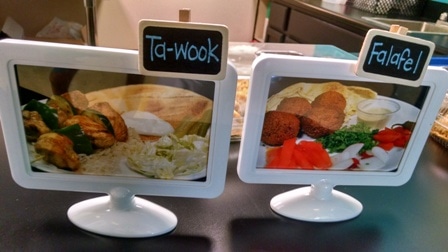
Yesterday our team was able to experience the deliciousness that is Lebanese food at a wonderful local restaurant, Belkoom. While enjoying our lunch we spoke with the Belkoom team and learned about the key role that spices play in this delectable cuisine. Nasri Salamoun explained to us, “As with any Mediterranean cuisine, Lebanese food relies heavily on olive oil, garlic, and lemon. Spices also play a key role. Individual spices like mint and sumac (not poison sumac!) are very popular in Lebanese cooking. So are spice blends, like seven spices and zatar.” The spice blend used within Lebanese food is one component that really sets this food apart—in true PSI fashion we couldn’t eat the tasty shawarma wraps, falafel, and tawook without contemplating the science behind the spice.
Some like it hot!
Often times we hear the word “spice” and our minds immediately go to heat! Ironically, the hotness of a food is not a taste or a flavor—it is the perception of pain (ouch). When discussing the heat of a pepper the words “Scoville Heat Units” are thrown around. In reality, this measurement is a subjective assessment of heat based on taste buds. The measurement is determined by diluting an alcohol-based extract made from the pepper in question until it no longer tastes hot to the person sampling the solution. We are excited to tell you there is a better, more quantitative and analytical way to assess pepper heat. The American Spice Trade Association (ASTA) has a recognized method for quantifying heat that utilizes High Performance Liquid Chromatography (HPLC). This is a scientifically sound alternative to the Scoville Heat Test. In this analysis the pepper fruit is dried, ground, and compounds are extracted and then injected into the HPLC instrumentation. The results quantify the chemicals responsible for the heat of the pepper.
Spicy Volatiles
What exactly happens when spices like zatar or sumac enter your mouth? The sensory information is received by the taste buds found on the tongue and is relayed to the brain for interpretation. However, this is done in conjunction with smell  perceived by the nose, which speaks to the volatile nature of spices. Think about it: to smell something the odor needs to be in the air, it makes sense, therefore, that spices are prone to evaporation. When the fragrant components of spices evaporate out, they leave behind a less pungent spice. It isn’t dangerous to consume expired or old spices, however it may leave your food a little lack-luster or unimpressive. The analytical method recommended for assessing the pungency of a spice is dependent on the spice in question. For example, to determine the pungency of cumin a spectroscopic method is used.
perceived by the nose, which speaks to the volatile nature of spices. Think about it: to smell something the odor needs to be in the air, it makes sense, therefore, that spices are prone to evaporation. When the fragrant components of spices evaporate out, they leave behind a less pungent spice. It isn’t dangerous to consume expired or old spices, however it may leave your food a little lack-luster or unimpressive. The analytical method recommended for assessing the pungency of a spice is dependent on the spice in question. For example, to determine the pungency of cumin a spectroscopic method is used.
Spice Safety
One area of particular interest to the spice industry is the adulteration of spices. Essentially, this is adding or removing materials that offer economic advantage to the adulterer. Not only is it a dishonest practice but it has the potential to harm the consumer if dangerous substances are introduced. As one of the measures to ensure the purity of a spice The ASTA recommends third party testing by an ISO17025 lab to ensure the quality of the spices. The ASTA also has recommended analytical methods for specific spices. For example, cinnamon is commonly adultered with coffee husks. The ASTA recommends microscopy analysis to ensure this has not occurred.
If you should be so lucky (as we were) to nosh on tasty Lebanese food, make sure you contemplate the science and analytical testing behind the myriad of spices used to flavor your kafta, falafal, and hummus. However, as Nasri explained to us, “the spices used are only one part of the Lebanese culinary experience. It’s also the way we prepare the food and the combination of vegetables, pickles, sauces, and bread that give our dishes a well-rounded and interesting taste.” If you are looking for that authentic Lebanese food experience we highly recommend checking out Belkoom, in Blacksburg, Virginia!
